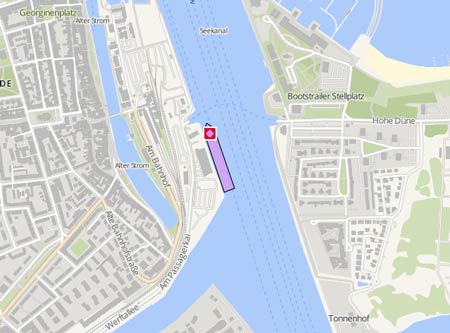SAKHALIN
Course/Position
Latest ports
Latest Waypoints
Latest news
Seventh sanctioned tanker unloaded Russian oil in China
The 'Sakhalin Island', the seventh and final tanker carrying Sokol oil and sanctioned by the U.S., arrived at the port of Tianjin and berthed at the Shihua Crude Oil Terminal on March 27 at 5.30 a.m. UTC, discharge its Russian oil cargo. The six other sanctioned tankers offloaded their Sokol oil cargo in China earlier in March, pushing China's March imports of seaborne Russian oil to a record high. The 'Sakhalin Island' started making its way to theTianjin late on MArch 25 after floating off the coast of nearby Shandong province for more than three weeks. Russia has been struggling with a Sokol glut amid ramped up U.S. sanctions. More than 10 million barrels of the oil supplied by Sakhalin-1, a unit of Rosneft (ROSN.MM), have been floating in storage over the past three months amid payment difficulties and sanctions on shipping firms and vessels carrying the crude. India, the top buyer of Russian crude in 2023, has retreated from purchases amid tighter sanctions, giving top global oil importer China the opportunity to scoop up the light sweet grade from Russia to replace costly Iranian supply. Chinese companies that received Sokol crude in March include Sinopec, PetroChina , Sinochem, CNOOC and independent refiners in Shandong. China's seaborne Russian crude imports were set to hit a record high in March at 1.816 million barrels per day, boosted by record imports of Far East Russian grades including 440,000 bpd of Sokol and 967,000 bpd of ESPO. Apart from the 'Sakhalin Island', the six other vessels that offloaded Sokol crude in China in MArch were the 'Krymsk', 'Liteyny Prospect', 'Nellis', 'NS Antarctic', 'NS Century' and 'NS Lion'. The tankers, except the 'NS Century', offloaded their cargo within temporary waiver periods from U.S. sanctions. All tankers are operated by companies tied to Sovcomflot. The U.S. has imposed sanctions on Russia's leading tanker group for violating a $60-per-barrel price cap on Russian crude oil exports. Aftr unloading their cargo, the 'Krymsk' and 'Liteneyny Prospect' were anchored off Nakhodka, while the 'Nellis', 'NS Antarctic' and 'NS Lion' were outside Yeosu. The 'NS Century' anchored off Qingdao.
14 Sovcomflot tankers pinned by USA
The USA have pinned 14 of Sovcomflot's tankers, the 'Anatoly Kolodkin' NS Antarctic', 'NS Lion', 'Ns Consul', 'Ns Burgas', Ns Captain' 'NS Columbus', 'Sakhalin Island', 'Nevskiy Prospect', 'Georgy Maslov', 'Liteyny Prospect', 'Krymsk' 'Ns Creation' and 'Ns Bravo', giving the Russian shipping company 45 days to unload oil and other cargo. The company is being prosecuted for violating the crude price cap in force since December 2022. This battalion of clandestine ships, owned by companies with opaque ownership to conceal illicit operations, has been in the crosshairs of the Western coalition for many months with widely documented practices such as STS oil transfer operations and deactivation of AIS, with the fleet constantly expanding. The Office of Foreign Asset Control of the Treasury (OFAC) has designated the 14 tankers in which Sovcomflot has an interest, and in particular 12 of the 75 vessels operated by the Oil Tankers SCF Management FZCO, a company which had to inherit part of of the SCF fleet when the latter was forced to sell or disperse to companies abroad following international sanctions. The first inclusion of SCF on the international sanctions list (United Kingdom, European Union, Australia, Canada, New Zealand, etc.) dates back to 2022 and concerned financial transactions involving long-term debt or new shares. The company has 45 days to unload oil and other cargo, but OFAC has not banned transactions for its other tankers and has even made it clear to oil traders that they can continue to use the large majority of the Russian carrier's fleet without repercussions, which claims 147 ships. Capping the price of oil, which consists of applying a discount per barrel of crude compared to the market price but without harming the stability of international markets, aims to limit the resources that Russia earns from the sale of hydrocarbons. Russia sold its oil in January at a discount of $19 per barrel compared to Brent (international benchmark) compared to $12 to $13 per barrel in October. With a barrel at this price, Russia therefore received 75% of the oil revenue it should have received, or 25% less. At the same time, Russian military spending has increased by 60%, leading many observers to say that the system is ineffective, due to a lack of monitoring and control means. 196 tankers, identified as belonging to the clandestine fleet, had left Russian ports in December 2023. Five new shipping companies based in the United Arab Emirates have started to transport Russian crude since November 2023. The US Treasury has sanctioned 27 oil companies for violating the price cap since October, when the cap was implemented.
Upload News

